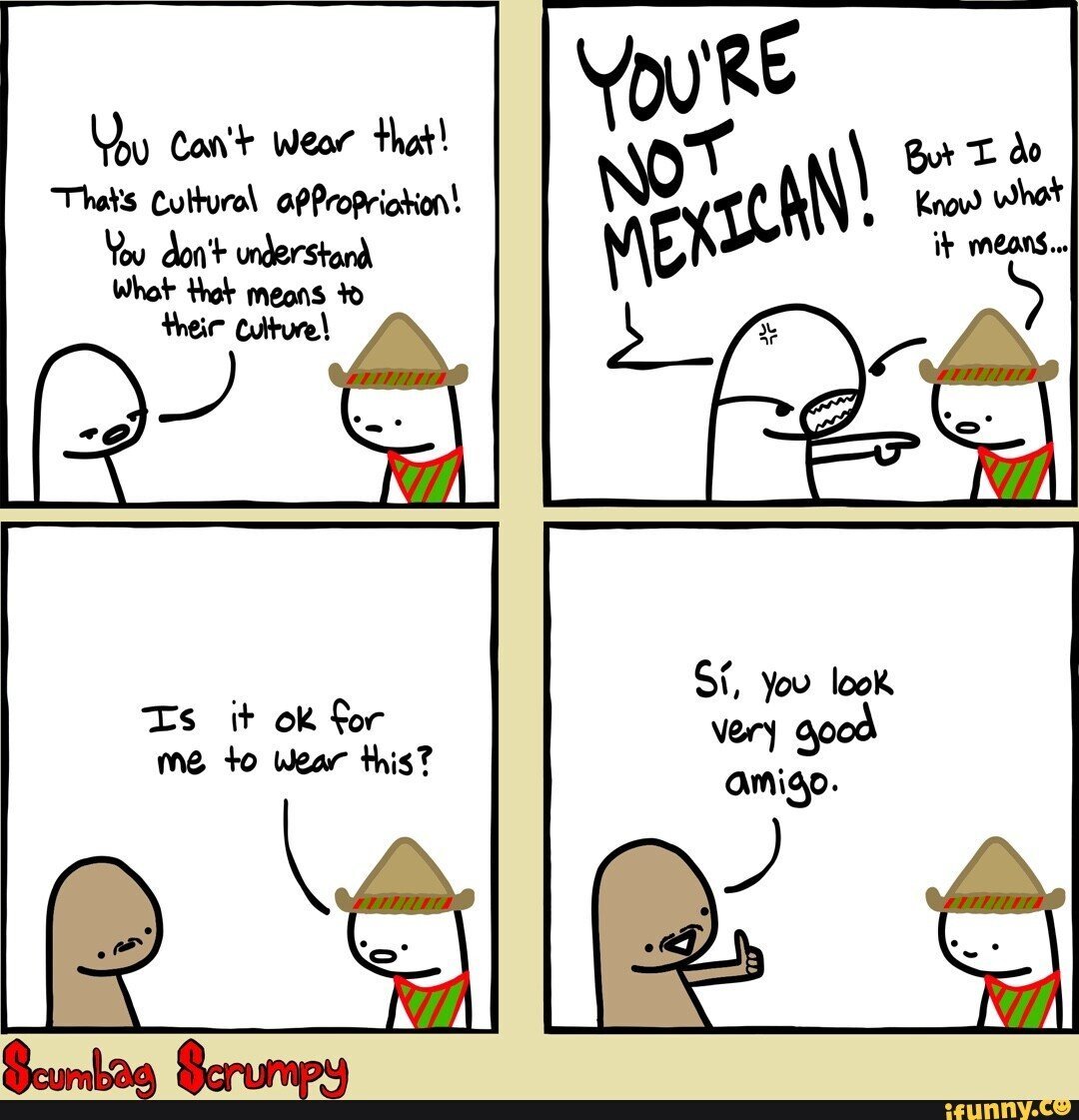Vicariously Offended
-
I remember seeing a child have a japanese themed birthday. Some white person was giving off to her parents for cultural appropriation while Japanese people were flattered
-
Found it

-
[email protected]replied to [email protected] last edited by
The only reason im replying is
being against IP as a concept
Has me hella curious. Can you elaborate? Is it the capitalist aspect of patents/trademarks and licensing or something else? I believe that people who invent a concept/character/world should have ownership to develop it into what their grander vision may be before someone else can come and write the story/use of their tool. Id love to hear your side of this though because I don't know anyone thats ever told me their against IP as a concept
-
You can say the most basic phrase in mandarin and completely screw it up both grammatically and pronunciation-wise and they'd absolutely love it and applaud you for it
Provided you're white
-
I know someone who said that America is racist for siding with Taiwan on things and then I pointed out to them that (except a minority) Taiwan is predominantly Han Chinese
-
[email protected]replied to [email protected] last edited by
Idk im just a white guy who loves dia de los muertos
How dare you
-
I have no problem with that at all. Please dress up for the 16th of September, the Mexican Independence Day, or as a catrín on Día de los Muertos. My Korean friend looked so good as an Adelita and I was so proud of her.
I guess I'd only have a problem with a Halloween costume that exaggerates a negative and unrealistic stereotype but I don't think people make those anymore, or at least I haven't seen one.
-
This is a loud wake-up call that the internet is not reality.
-
[email protected]replied to [email protected] last edited by
So, virtue signaling?
Ah, as expected
-
It's damn true. I ran a crew of workers that were Spanish speaking. After two years all I gotta say is, is there a word that isn't used as a dick?
-
Funny that i'm chinese and living in asia as well and i support that. Western folks have a weird sense of justice that they want to protect everyone, to a point i feels like they're seeing us as a lesser kind that need protection.
-
I think it's NIMBYism in a way. Sure, they like to talk to Laowai and like it when they do something Chinese, but they don't really want them intruding on their social media network. The Great Firewall exists for a reason- Chinese culture and attitudes are vastly different to that of the west. There was a joke going around that watching Chinese short-form videos "is like tuning into interdimensional cable"
-
[email protected]replied to [email protected] last edited by
Some people just love to find reasons to get offended.
Hell, a way to carry a baby was called cultural appropriation by some black people where I live when first Nations have been carrying their baby the same way on our territory since way before any black people set foot in northern America but we don't hear them complain.
-
I love this
-
She's wearing chopsticks in her hair which is generally frowned upon. She could've used a broach or a traditional kansashi instead which would've made her look more elegant.

-
We will always love to see others enjoy a part of our culture (as long as it is not in an exploitative and fetishistic way).
I think this is a big part of the why some people get all white-knight about cultural appropriation. It can be quite difficult to know, as a cultural outsider, and from a glance, when something is being done in an exploitative and/or fetishistic way.
-
[email protected]replied to [email protected] last edited by
Enjoying other cultures isn't appropriation. I think the line where it becomes appropriation is profiteering. If you are commodifying and profiting off someone else's culture that's pretty shitty. Obviously that's not a perfectly clear cut line (who 'owns' culture?), but it's a good place to start.
-
[email protected]replied to [email protected] last edited by
This is a great read on the IP topic. I highly recommend it:
This is the co-author's site and it does contain the full text, although physical copies are available directly from the Cambridge University Press.
Here's a summary:
“Intellectual property” – patents and copyrights – have become controversial. We witness teenagers being sued for “pirating” music – and we observe AIDS patients in Africa dying due to lack of ability to pay for drugs that are high priced to satisfy patent holders. Are patents and copyrights essential to thriving creation and innovation – do we need them so that we all may enjoy fine music and good health? Across time and space the resounding answer is: No. So-called intellectual property is in fact an “intellectual monopoly” that hinders rather than helps the competitive free market regime that has delivered wealth and innovation to our doorsteps. This book has broad coverage of both copyrights and patents and is designed for a general audience, focusing on simple examples. The authors conclude that the only sensible policy to follow is to eliminate the patents and copyright systems as they currently exist.
-
[email protected]replied to [email protected] last edited by
Clothing and food are surface, but important, cultural signs. It can be easy to observe and emulate these for one's own gain either socially or econically. All the while the culture from which these signs are derive are ignored.
Dressing up like a war chief for Halloween is partaking in the costume, but not the culture.
But who cares, right?
It's important to root these in a history of colonial exploitation, marginalization, and erasure. A group of people whose way of life has been noted as barbaric, backwards, or savage were often the same reasons colonial powers saw it fit to steal from them, enslave, and murder them. Donning a cultures dress or making their food tastes "better" has done nothing to restore connection with that culture. It is just a more polite form of their erasure. They have been robbed of their soveignty.Another phenomena, as noted in the comic, is the chill acceptance of this by the appropriated culture. Here, they face no real erasure. Heck, you don't really see this in newly immigrated peoples who want to make a better life for themselves. Being seen is success. But you speak to their first generation children and having their culture flattened to the surface signs can be infuriating if you are the type who views assimilation as a type of loss.
I personally think there is space for a member of the dominant culture to appreciate the culture if they've been invited. But it is important to be careful here as well. Because you may have earned that right with one group from within the culture, but that is not transferable and that exception must be earned again.
Heck, it gets even more complicated when people looking to just keep their schools open and working sge adults employed couldn't care less when asked, but will ask if there's anything that can be done to stabilize their community.
So I've written a lot and feel like I missed so much and glossed over much of what is important. What have you read about the subject that really attempted to wrestle with the concept?
-
I agree mostly with your general point, but I want to talk a bit about your example. I think it's okay to mock the Pope because I think religion is silly and ought to be mocked a bit. Of course, if you're Catholic, you might disagree. It's a good example for that reason. However, Catholics have a lot of power in society. They are not as marginalized as many other groups. So the example might not hit for everyone because intuitively, they don't think mocking Christianity or Catholicism is going to cause much harm in a western country where these groups are incredibly powerful.
Appropriation, and/or, as you said, stereotypes and jokes, are often mocking a culture or a people too. If they are a marginalized group, which often they are if they're being mocked, then it can add insult to injury
To clarify, here's a good example: As another commenter pointed out; appropriation is actually about making fun of things that other cultures hold sacred. An example I have heard of (but am pretty ignorant about myself) is wearing a native american feathered headdress.
I have heard it's reserved for specific people that indigenous Americans want to honor with it. It's like wearing a medal as a general. So, wearing a feathered headeess and cosplaying as native is belittling something they hold sacred.

